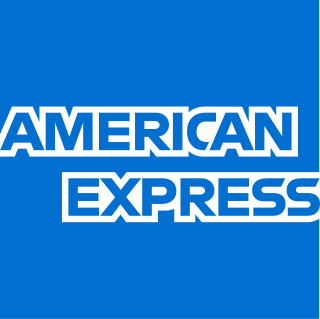EF Hutton was an American stock brokerage firm founded in 1904 by Edward Francis Hutton and his brother, Franklyn Laws Hutton. Later, it was led by well known Wall Street trader Gerald M. Loeb. Under their leadership, EF Hutton became one of the most respected financial firms in the United States and for several decades was the second largest brokerage firm in the country.

The American Express Company (AmEx) is a multinational corporation specialized in payment card services headquartered at 200 Vesey Street in the Battery Park City neighborhood of Lower Manhattan in New York City. The company was founded in 1850 and is one of the 30 components of the Dow Jones Industrial Average. The company's logo, adopted in 1958, is a gladiator or centurion whose image appears on the company's well-known traveler's cheques, charge cards, and credit cards.

Sanford I. "Sandy" Weill is an American banker, financier and philanthropist. He is a former chief executive and chairman of Citigroup. He served in those positions from 1998 until October 1, 2003, and April 18, 2006, respectively.
Morgan Stanley Wealth Management is an American multinational financial services corporation specializing in retail brokerage. It is the wealth & asset management division of Morgan Stanley. On January 13, 2009, Morgan Stanley and Citigroup announced that Citigroup would sell 51% of Smith Barney to Morgan Stanley, creating Morgan Stanley Smith Barney, which was formerly a division of Citi Global Wealth Management. The combined brokerage house has 17,646 financial advisors and manages $2 trillion in client assets. Clients range from individual investors to small- and mid-sized businesses, as well as large corporations, non-profit organizations and family foundations.
Lehman Brothers Holdings Inc. was a global financial services firm founded in 1847. Before filing for bankruptcy in 2008, Lehman was the fourth-largest investment bank in the United States, with about 25,000 employees worldwide. It was doing business in investment banking, equity and fixed-income sales and trading, research, investment management, private equity, and private banking. Lehman was operational for 158 years from its founding in 1850 until 2008.
Kuhn, Loeb & Co. was an American multinational investment bank founded in 1867 by Abraham Kuhn and his brother-in-law Solomon Loeb. Under the leadership of Jacob H. Schiff, Loeb's son-in-law, it grew to be one of the most influential investment banks in the late 19th and early 20th centuries, financing America's expanding railways and growth companies, including Western Union and Westinghouse, and thereby becoming the principal rival of J.P. Morgan & Co.
A. G. Becker & Co. was an investment bank based in Chicago, Illinois, United States.
Hayden, Stone & Co. was a major securities firm founded in 1892 by Charles Hayden and Galen L. Stone. The firm was acquired by Cogan, Berlind, Weill & Levitt in 1972 and, after its name disappeared in 1979, was part of what would become Shearson/American Express in 1981.
H. J. Meyers & Co, Inc. of Rochester, New York is a defunct investment banking and brokerage firm that specialized in small cap and micro cap financings. It was originally known as Thomas James Associates, Inc before they acquired H.J. Meyers & Co, Inc. The firm had a reputation of being a boiler room that operated within the realm of unscrupulous policies, stock manipulation, fraudulent, high pressure sales tactics and excessive markups were common.
L.F. Rothschild was a merchant and investment banking firm based in the United States and founded in 1899. The firm collapsed following the 1987 stock market crash.

Shearson was the name of a series of investment banking and retail brokerage firms from 1902 until 1994, named for Edward Shearson and the firm he founded, Shearson Hammill & Co. Among Shearson's most notable incarnations were Shearson / American Express, Shearson Lehman / American Express, Shearson Lehman Brothers, Shearson Lehman Hutton and finally Smith Barney Shearson.
Loeb, Rhoades & Co. was a Wall Street brokerage firm founded in 1931 and acquired in 1979 by Sanford I. Weill's Shearson Hayden Stone. Although the firm would operate as Shearson Loeb Rhoades for two years, the firm would ultimately be acquired in 1981 by American Express to form Shearson/American Express and three years later Shearson Lehman/American Express.
Cogan, Berlind, Weill & Levitt, originally Carter, Berlind, Potoma & Weill, was an American investment banking and brokerage firm founded in 1960 and acquired by American Express in 1981. In its two decades as an independent firm, Cogan, Berlind, Weill & Levitt served as a vehicle for the rollup of more than a dozen brokerage and securities firms led by Sanford I. Weill that culminated in the formation of Shearson Loeb Rhoades.
Shearson was a well-known brand in the financial services industry from 1901 through 1993, related to the following:

Edward Shearson was a banker, millionaire and founder of Shearson, Hammill & Co., which was among the largest brokerage and investment banking firms in the United States.
Hornblower & Weeks was an investment banking and brokerage firm founded by Henry Hornblower and John W. Weeks in 1888. At its peak in the late 1970s, Hornblower ranked eighth among member firms of the New York Stock Exchange in number of retail offices, with 93 retail sales offices located in the United States and Europe.
Peter A. Cohen is the chairman and CEO of Andover National Corporation, a public holding company. He was formerly the chairman and CEO of Cowen Inc., also known as Cowen & Company. Prior to his current role, Cohen founded Ramius Capital Management in 1994, a $13 billion investment firm, which he merged with Cowen Inc. in 2009. Prior to this, Cohen was the chairman and chief executive officer of Shearson Lehman American Express from 1983 through 1991.
Hammill is a surname. Notable persons with that surname include:
Alger "Duke" Chapman Jr. was the President and CEO of Shearson, Hammill & Co. and Chairman and CEO of the Chicago Board Options Exchange from 1986 to 1997.
John Langeloth Loeb Sr. was an American investor and executive who served as president of Loeb, Rhoades & Company.






